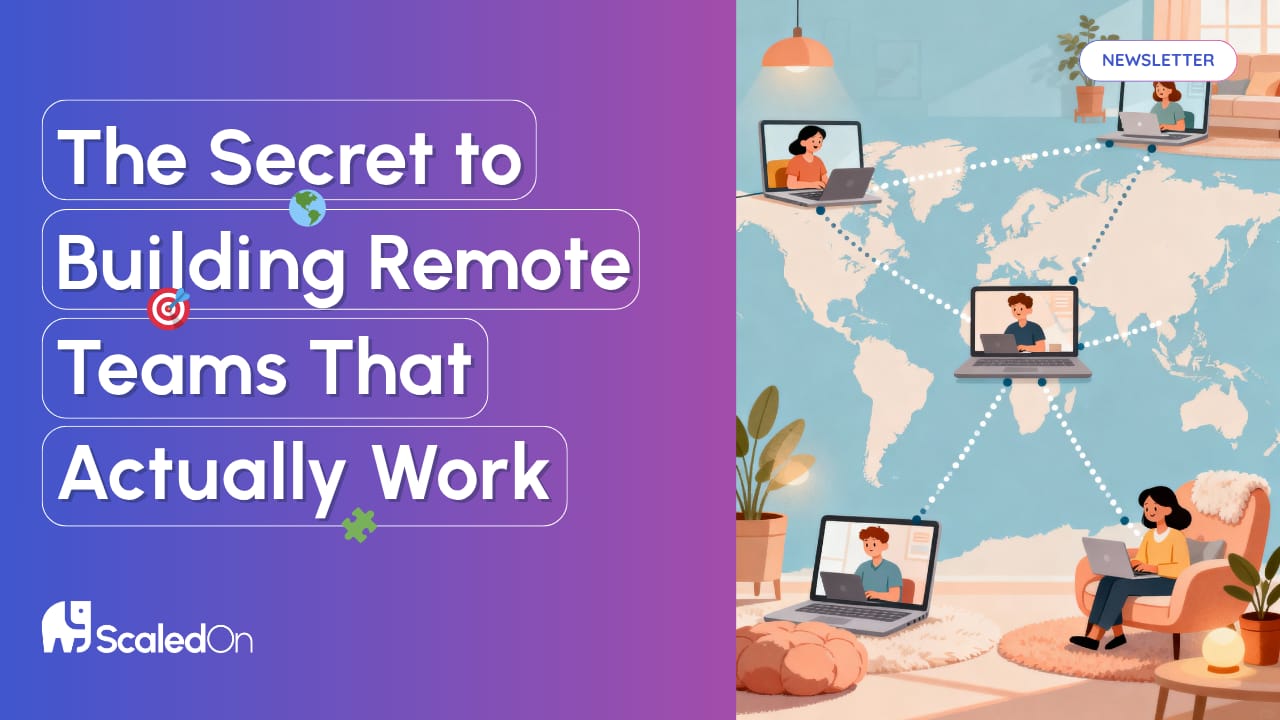We get asked this all the time:
“How do you run a fully remote agency across 5 countries and still keep people motivated and accountable?”
The truth is: accountability doesn’t come from sitting in the same office. It comes from culture, trust, and systems that actually work.
We’ve been fully remote for over 12 years.
Our team members stay with us for an average of 3+ years — almost unheard of in agency life.
Many of our clients have partnered with us for 9+ years, because culture and consistent delivery outlast flashy promises.
We don’t just hire smart people. We hire for cultural fit, provide clarity, and build systems that make accountability automatic. That’s how we scale trust across borders, and why our team and clients stick around.
⚡ Quick Insight
Companies fail at remote work because they try to copy-paste the office online.
Zoom marathons replace meetings. Managers obsess over “green dots.” Motivation tanks.
And they fail because leaders assume what motivates them will motivate everyone else.
Spoiler: it won’t.
Meanwhile…
We’ve built a remote structure that’s worked for 40+ experts across 7 time zones.
Retained top talent and long-term clients through trust, not micromanagement.
Find talent 3x faster with AI scoring + DISC assessments.
It’s not magic. It’s systems, discipline, and culture.
🧠 Deep Dive: Our Remote Culture Playbook
We’ve learned (the hard way) that running a high-performing remote team requires three layers:
1. Hire for Behavior, Not Just Skills
We don’t just hire for résumés, we hire for fit and growth.
DISC assessments → show how someone works under pressure.

AI scoring → filters hundreds of applications to the top 2% match.
Cultural interviews → check whether they’ll thrive with us and with clients.
2. Systems That Create Visibility
We don’t micromanage, we make work visible.
Asana → projects and tasks with clear deadlines.
Notion → our knowledge hub + automations.
Assembly → recognition + micro-thank yous from peers that keep motivation high.
Slack → communication, reminders, learnings sharing,social interraction.
📊 Our rhythm:
Weekly department meetings → set priorities, review blockers.
Monthly all-hands → big-picture strategy, wins, lessons and games.
1:1s as needed → solve problems, not just “check in.”
3. Cultural Context: Motivation Isn’t One-Size-Fits-All
We anchor culture on:
Safety → People feel trusted.
Vulnerability → Leaders admit mistakes first.
Purpose → Every task ties to client KPIs.
But here’s the nuance: motivation isn’t universal.
Individualist (U.S., UK): Motivated by autonomy + personal recognition.
Collectivist (Eastern Europe, LatAm, Asia): Motivated by belonging + group wins.

Source: geerthofstede.com
Low Power Distance (Scandinavia, U.S.): Motivated when leaders are approachable and open.
High Power Distance (Asia, parts of Eastern Europe): Motivated by clear structure + authority.

Source: geerthofstede.com
Task-Oriented (Germany, U.S.): Motivated by hitting measurable goals.
Relationship-Oriented (LatAm, Southern Europe): Motivated by trust + rapport.
💡 Example:
A U.S. media buyer (high “D”) thrives on ownership and recognition.
A Romanian account manager (high “S”) may be more motivated if you show how their steady support stabilizes the team and the client relationship.
Both are excellent, but their motivators are not the same.
Adapt motivation to culture, and people stay. Ignore it, and turnover rises. We hate turnover.
4. Overdeliver for Clients
Our culture isn’t just internal, it shows in how we serve.
Every deliverable has a clear owner + deadline.
We aim to overdeliver, not just deliver.
Our mindset: solve problems, don’t sell hours.

If you’re struggling to build a team that scales with you instead of slowing you down, we can help.
We don’t just run campaigns, we embed experts who fit your culture and deliver outcomes.
👉 Book a free strategy call with us here.
Remote work doesn’t kill culture, it reveals it.
When you strip away offices, perks, and presenteeism, what’s left is whether your team feels safe, supported, and connected to purpose. That’s what scales.
Let’s scale smarter,
-Iulia
🚀 Don’t miss our next Live Q&A on October 2nd at 12PM EST: Where Paid Media, SEO, and AI Collide: What Marketers Need to Know.
Bring your toughest questions or just join and listen in. Either way, you’ll walk away with actionable insights.
👉 Register here!




